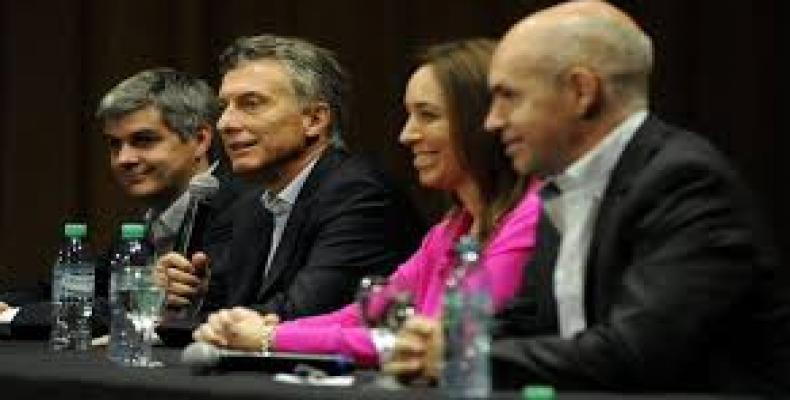Buenos Aires, November 24 (teleSUR-RHC)-- Argentinean president-elect, Mauricio Macri, vowed to make drastic changes Monday to open up the economy to investors and rearrange foreign ties after his electoral victory over government-backed Peronist candidate Daniel Scioli on Sunday.
“You made the impossible possible,” Macri of the Let’s Change coalition said to supporters Sunday night. Indeed, Macri’s victory marks the first time the corporate elite-aligned, right-wing has come to power in Argentina through democratic means.
Macri, a businessman and former mayor of Buenos Aires, has promised to cut capital controls and trade restrictions in the name of boosting the ailing economy. He is also expected to cut subsidies to energy and transportation sectors.
"The is the beginning of a new era that has to carry us toward the opportunities we need to grow and progress," Macri said to supporters Sunday night.
Critics say Macri’s proposals will turn the country back to 1990s neo-liberalism, rolling back the social welfare programs of President Cristina Fernandez and her husband, former President Nestor Kirchner, which have benefited poor and working class Argentineans.
Macri also immediately pledged to reshape international relations, saying he wants Argentina to have “a good relationship with all countries.”
The president-elect said he wants to see Venezuela suspended from the South American regional bloc MERCOSUR and has promised to introduce a “democratic clause” against Venezuela, a country with which President Fernandez cultivated close ties with the regional goal of strengthening Latin American integration.
Macri is expected to strengthen relations with the United States and the European Union. His first international visit will be to Brazil to discuss with President Dilma Rousseff reinvigorating trade relations between the two South American countries.
One of Macri’s first steps will be to select his cabinet of ministers, including a new economy chief. Speculation suggests the new minister of the economy will have ties to business elites and be well-positioned to head corporate-friendly economic development.
Macri has been a director of his father’s corporate conglomerate Socma for many years. Socma has been shown to have benefited economically from dictatorship rule in Argentina, and Macri’s close relationship to business elites, which historically propped up right-wing military regimes in the country, also signals dictatorship ties.
After a heated campaign and the first presidential runoff in the country’s history, Macri won with 51.4 percent of the vote.
Macri will be sworn in as the next president of Argentina on December 10th.


